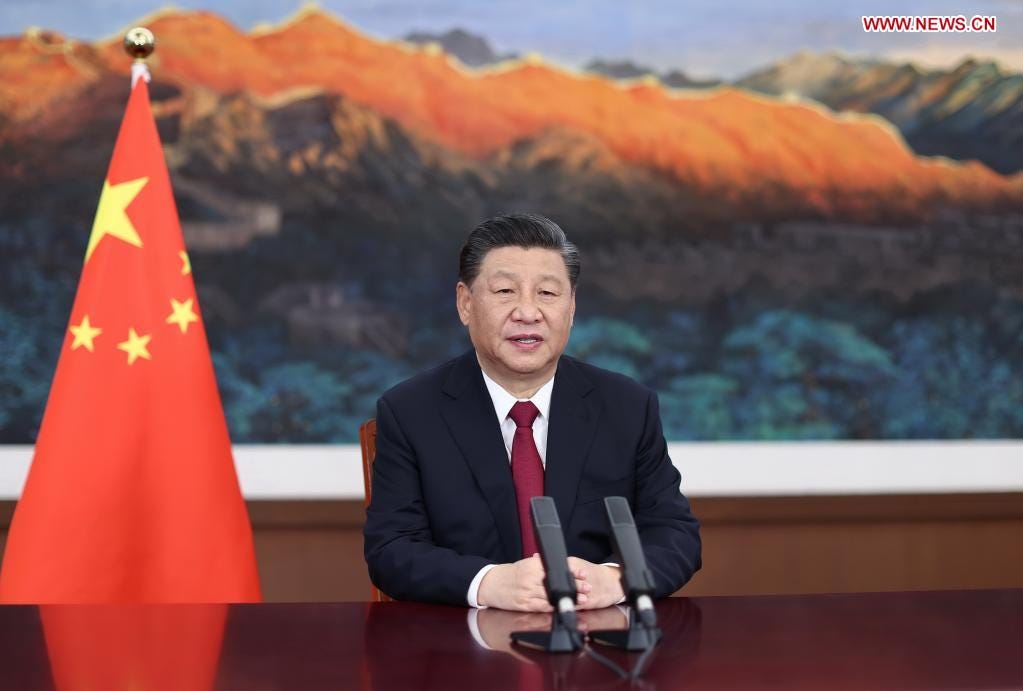Xi Jinping's subtle rebuke, volcanic ash blankets St Vincent and Netflix's slowing customer growth
19 - 25 April 2021
Hello and welcome!👋
Happy Sunday! Remember you can follow Deep Dive on Instagram for additional content and daily updates. Click the button below.
VEILED CRITIQUE
“Bossing others around or meddling in others’ internal affairs will not get one any support.”
“One or a few countries shouldn’t impose their rules on others, and the world shouldn’t be led on by the unilateralism of a few countries.”
Those were some of the bold statements made by President Xi Jinping on Tuesday at an annual gathering of business and political elites. Although the Chinese leader didn’t name the US directly, his speech was interpreted as a subtle warning to Washington.
Despite the change of administration at the White House, tensions between the US and China remain high. Joe Biden and his top diplomat Antony Blinken are keeping a firm stance on Beijing.
Since January, Washington has criticised the CCP for taking aggressive actions towards Taiwan, not disclosing information on Covid-19, and trampling on human rights in Hong Kong and Xinjiang. In fact, Biden’s team has bluntly said that the “growing rivalry with China” is a key foreign policy issue.
So when Xi spoke via video link to address the Boao Forum - often called Asia’s Davos - he used the opportunity to hit back and emphasise a shifting international power balance:
A dominant country, i.e. the US, can no longer dictate the terms and conditions of the global order (“The future of the world should be decided by all countries working together”)
In a truly multipolar system, various ideologies and governments have to be accepted (“In state-to-state relations, the principles of equality, mutual respect and mutual trust must be put front and centre”)
Domestic matters are private and not up for debate or discussion (“It is unpopular to arrogantly instruct others and interfere in internal affairs”)
Economic openness, rather than tariffs and sanctions, is vital to boosting the post-Covid recovery (“Attempts to erect walls or decouple run counter to the law of economics and market principles”)
Undoubtedly, analysts will be closely watching how this mindset plays out when it comes to agreements on trade, climate change, security, technology, finance etc.
VOLCANIC THREAT
After decades of inactivity, La Soufriere volcano on St Vincent is now causing turmoil across the Caribbean island.
The volcano’s first full-blown eruption - on 9 April - spewed clouds of ash nearly 10 kilometres into the air. There have been numerous eruptions since then, blanketing the northern part of St Vincent in centimetres of grey dust and debris.
More than 15,000 residents were evacuated to safer areas earlier this month when seismic activity was detected, but many people are suffering as the thick ash has destroyed acres of crops, triggered power outages and contaminated water supplies.
For the moment, St Vincent’s authorities say there are no casualties as a result of the eruptions, but the economic devastation and emotional distress are significant. Scientists also expect La Soufriere to continue rumbling for another week or so, adding to the costs of humanitarian relief.
The island's Prime Minister Ralph Gonsalves has called for additional international aid. On Tuesday, the UN launched a funding appeal for US$29.2 million to assist the most vulnerable with basic needs, including clean water, food and shelter, as well as to help initiate recovery.
A separate concern is how to clean up and dispose the massive amounts of ash. La Soufriere isn’t just affecting St Vincent - the winds have carried ash all the way to Barbados, about 190 kilometres east.
This report by Britain’s Channel 4 News shows the “apocalyptic” situation on the ground:
THE STREAMING WARS
Is Netflix’s red-hot streak over? The company’s stock tumbled this week following the release of its earnings report. Investors are still studying the latest numbers to gauge whether the streaming wars will take a toll on the entertainment giant.
Netflix said it added 3.9 million subscribers in the January-March quarter, but its original forecast for the period was 6 million [Reminder: Netflix booked a record 15.8 million customers in Q1 2020]. Furthermore, the company estimates it will add just 1 million new customers in the second quarter of this year.
Although Netflix’s revenue was slightly better than expected, there are worries about what the easing of strict pandemic measures will mean for the streamer. Netflix cashed in on the Covid crisis since people around the world were stuck at home and wanted shows to watch. However, the slow return of outdoor activities could see hundreds - or perhaps thousands - of customers pull the plug.


On top of that, Netflix is competing in an increasingly crowded field, especially in North America. While it’s the number one player by a large margin, Netflix’s market share is declining. For instance, Disney+ passed the 100 million subscriber mark in March, thanks to the catalogue of Star Wars, Marvel Cinematic Universe and classic animations.
But Netflix’s executives don’t believe rival services or price hikes are to blame. Instead they reckon the lighter content slate at the start of 2021 weakened growth. In a letter to shareholders, senior management said a raft of new shows and movies, such as Red Notice and season five of Money Heist, will entice viewers to sign up.
Another important factor is international expansion. Currently, Netflix has 208 million customers globally. The company is determined to ramp up production in places like India and South Korea to broaden and diversify its base.
What are your thoughts on Netflix’s fortunes? Would you rather pay for HBO Max, Apple TV+ or Amazon Prime?
If you enjoyed reading the newsletter, feel free to share this edition with your friends, family and colleagues. Stay curious, Sara x





Amazing like always❤️